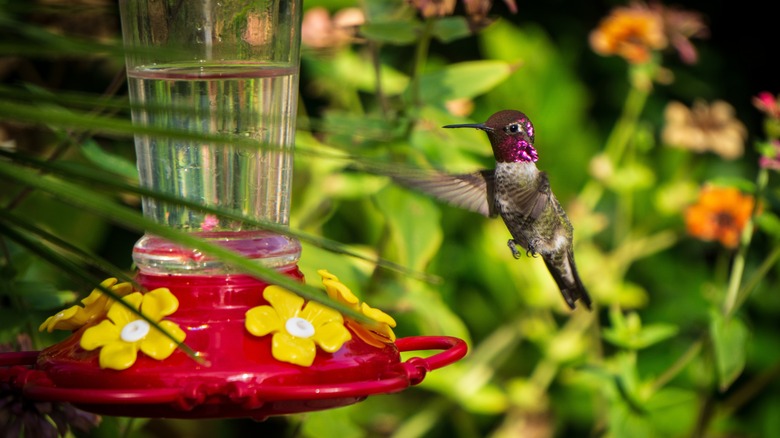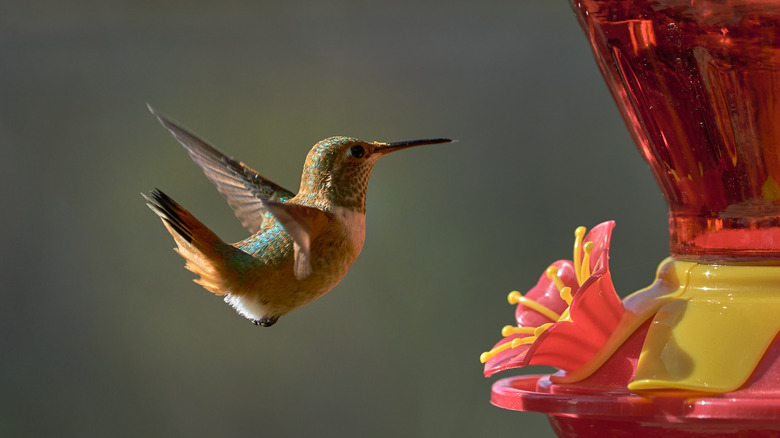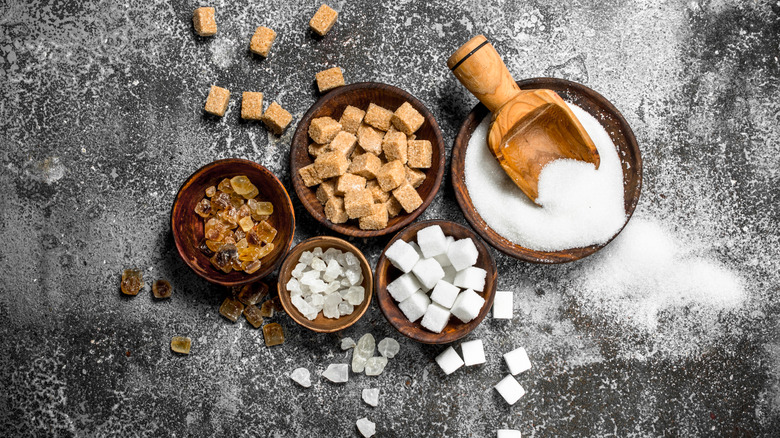All The Reasons Why You Should Never Use Honey In Hummingbird Feeders
Adding a hummingbird feeder to your garden is a wonderful way to attract these gorgeous birds to your backyard. However, while building one is much easier than you think, maintaining it properly will require some special preparation. For one, you'll want to avoid the mistakes everyone makes when cleaning hummingbird feeders. Namely, not cleaning it enough or using solutions that can be toxic to birds.
Similarly, mixing the incorrect type of sweetener into your sugar water is another major error you don't want to make with your feeder. Hummingbirds love to drink sugary water, and making homemade nectar is super simple and cheap. All you need to do is mix one part refined white sugar with four parts tap water, boil the solution, and that's it. If you're thinking of sweetening the deal with honey — don't. Whether it's diluted with water or added to your homemade nectar, honey can actually cause great harm to hummingbirds, even resulting in death. Not only can it wreak havoc on a bird's digestive system, it can also spawn dangerous infections, and even attract unwanted predators. Here are all of the reasons why you should never, ever add honey to a hummingbird feeder.
Why honey is so dangerous for hummingbirds
Honey may be a great alternative to sugar for us humans, but the same doesn't hold true for hummingbirds. For one, the high level of sugar found in honey makes it difficult to digest and metabolize. While the ideal hummingbird nectar has 15% to 25% sugar, honey's sugar levels can be as high as 80%. This means that hummingbirds visiting your yard won't be able to draw the appropriate nutrition and energy from it. Mixing honey with water also results in rapid fermentation, which in turn causes bacteria and mold to grow. When ingested by hummingbirds, this can make them sick and, sadly, it can be fatal.
Another major issue is just how sticky honey is. If it gets on a bird's feathers or on its bill, it can act like glue, making it difficult to eat and fly. Not to mention, it will likely stay on for an extended period of time, as it's so hard to clean off. Similarly, honey's thick consistency can also wreak havoc on the feeder itself, clogging it and making drinking difficult. The sweet concoction is likely to attract unwanted insects, like wasps, bees, and ants, to your feeder, keeping hummingbirds at bay. Not to mention it can also be enticing to raccoons and even bears, putting your own safety at risk.
Other sweeteners you should never use
It can be tempting to add various sweeteners to your DIY nectar in an effort to make it even more appealing, but most ingredients can actually cause great harm to hummingbirds. Molasses and brown sugar, for example, have such high levels of iron that they can be outright toxic to your feathery friends. Icing sugar and fruit juice, on the other hand, are problematic because of how quickly they ferment. This, in turn, will cause bacteria to grow, which can make birds seriously ill when ingested. You also can't be sure what preservatives and additives were added to a store-bought juice and how these will impact a hummingbird's health.
Lastly, never mix an artificial sweetener into your homemade nectar, as this will result in malnutrition because it does not contain calories. And while it's true that hummingbirds are attracted to the color red, don't be tempted to add red food coloring to your mixture — the artificial chemicals used to create the color can be adverse to their health. Instead, stick to what hummingbirds will enjoy and thrive on: plain white table sugar.


